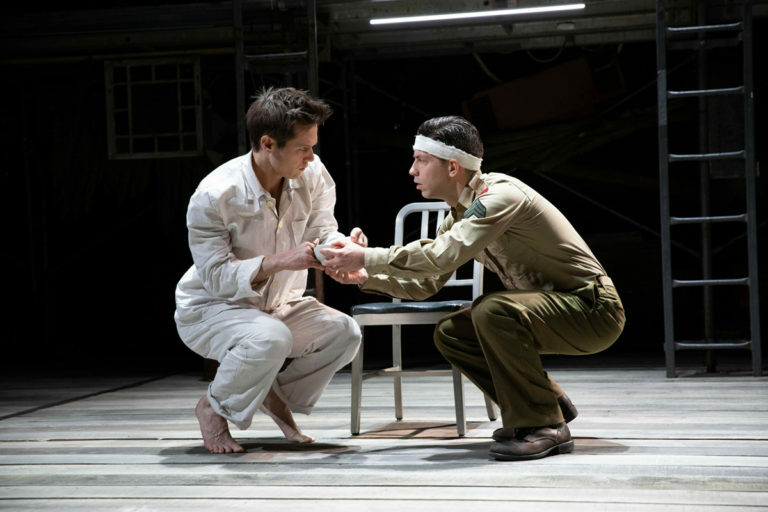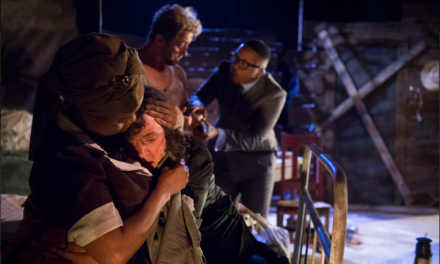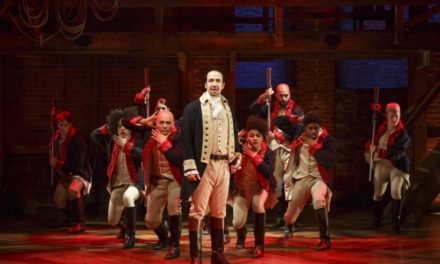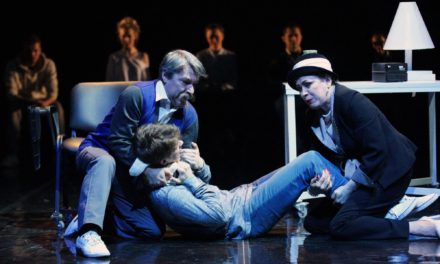Birdy, an adaptation by Naomi Wallace of William Wharton’s once renowned 1978 novel is now playing at Babson College in Wellesley, Massachusetts, the winter home of the Commonwealth Shakespeare Company. (In summer the company performs Shakespeare outdoors on the Boston Common.) Wharton’s best seller about a close, but unusual friendship between two boys, Birdy and Al, who came from a poor neighborhood in the suburbs of Philadelphia won the US National Book Award and was translated into twenty languages. A 1984 film version set during the Vietnam War directed by Alan Parker and starring Nicholas Cage and Matthew Modine received the Grand Prix Spécial du Jury at Cannes.
Naomi Wallace, originally from Kentucky, was living in Britain when she was requested to turn Birdy into a play. It opened in 1997 in the West End to strong reviews. Wallace wrote in a young Birdy and young Al who first meet at the age of thirteen and two older ones both seriously wounded in World War II. The two sets of characters are often onstage simultaneously.
The Commonwealth Shakespeare Company’s version of the play is skillfully directed by Stephen Maler. Producer Spring Sirkin convinced Wallace to change her original ending which is now stronger, sadder, and more realistic. The stage is dominated by designer Clint Ramos’s three-story structure built of scaffolding used by the young Birdy (Spencer Hamp) and young Al (Maxim Chumov) as a hangout for their adventures.
Young Birdy, as his name indicates, is obsessed by birds particularly their ability to fly. He spends hours studying them, exercising to strengthen his chest, and even makes himself a pair of wings. He often enlists Al’s help when he jumps off the structure, only to fall. Unlike Birdy Al, who presents himself as a tough guy, is afraid of heights. As they grow older, Al becomes attracted to girls while Birdy is repelled by them. Only birds arouse him sexually. Canaries are his favorites.
The boys graduate high school and are inducted into the army. At the beginning of scene two, a wounded Sergeant Al (Keith White) arrives at the mental hospital in Kentucky where Birdy is being kept. Al whose jaw was dismembered in battle was awaiting an operation in another military hospital some distance away when he was summoned by Dr. White, a psychiatrist and major in the army (Stephen Barkhimer). The arrogant and nasty Dr. White is at a loss when it comes to treating Birdy, a victim of combat neurosis, who no longer talks, walks, or feeds himself.
Al learns more about Birdy’s state from Renaldi (Damon Singletary) a conscientious objector serving as a nurse. Al tries his best to help his friend who crouches in a bird-like position, his head turned away.
The acting is strong throughout. Spencer Hemp and Will Taylor are both believable as the younger and older character of Birdy that could have emerged from a fantasy. Keith White gives a complex performance as Al who despite his love for Birdy rejects him at least twice. As the doctor/major and nurse/CO Stephen Barkhimer and Damon Singletary represent two opposing views of war.
This article was originally published in Capital Critics Circle on March 8, 2019, and has been republished with permission.
This post was written by the author in their personal capacity.The opinions expressed in this article are the author’s own and do not reflect the view of The Theatre Times, their staff or collaborators.
This post was written by Jane Baldwin.
The views expressed here belong to the author and do not necessarily reflect our views and opinions.

















